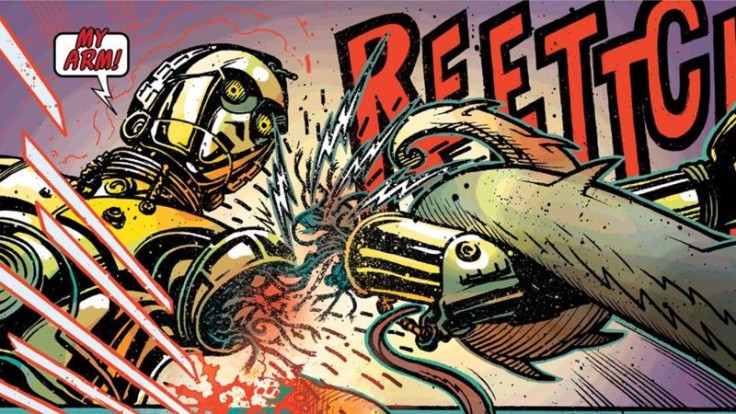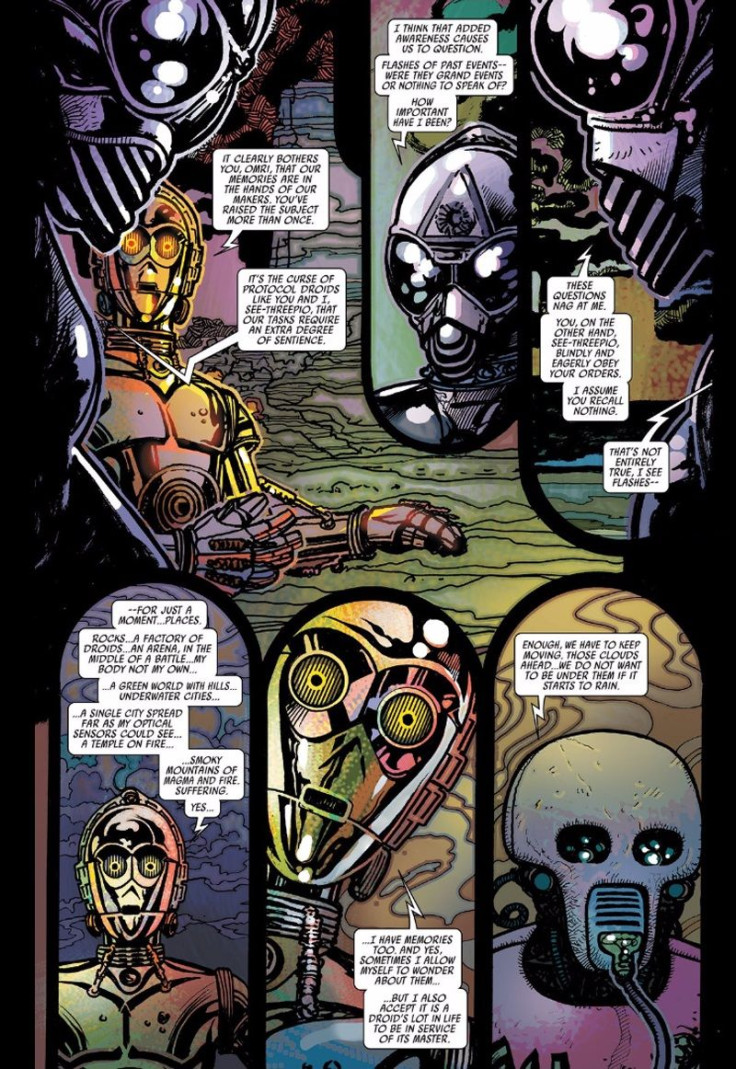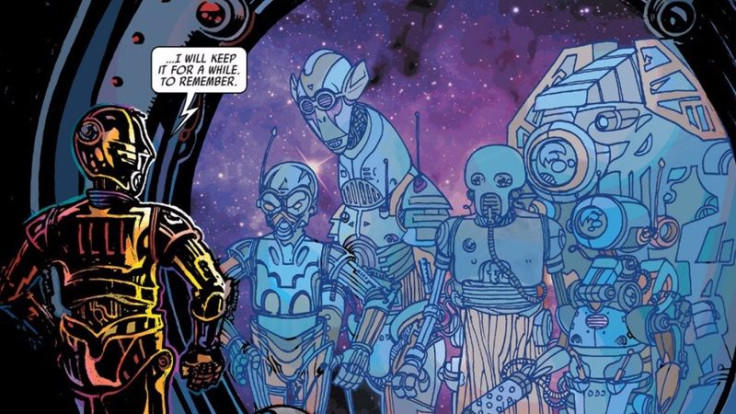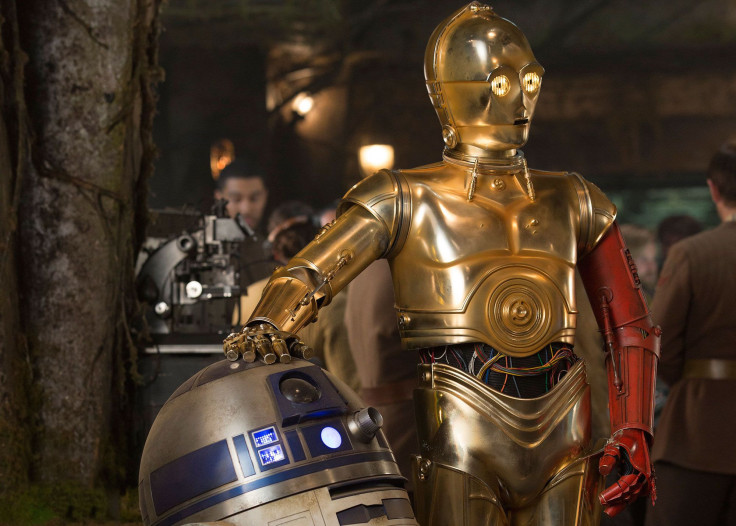Marvel’s Star Wars: C-3PO #1 , by James Robinson, Tony Harris and Joe Caramagna, finally explains how C-3PO got his red arm. Stranded on an unknown planet with Resistance compatriots and a single First Order droid held prisoner, C-3PO watches his fellow droids die one by one as they traverse the planet in an effort to beam intelligence back to the Resistance. Soon it’s just him and the First Order droid Omri, who has grown reflective about his role in a war over which he has no control. If droids are no more than tools, without even memories to call their own, why should they pretend to be on opposite sides of a Galactic conflict?
It’s an arresting conflict, one that ends with pat precision, as Omri sacrifices himself to send out a distress signal, leaving behind only a red arm. C-3PO has it attached where his own arm was ripped off, saying, “I will keep it for a while. To remember.”

C-3PO #1 is a reminder that so many of our most aspirational fictional universes, realms full of the good and the noble, swollen with human spirit, are premised in unforgivable transgressions against society at large.
In the Harry Potter series, the wizarding world withholds extravagant advances—including vast medical knowledge that could save millions of lives—from the rest of humanity. In Star Wars, Luke Skywalker casually erases the memories and lived experiences of sentient beings, which he buys and sells as chattel. Batman embraces authoritarian powers in The Dark Knight to track down the Joker, the next logical step in a crusade against crime that denies any role for collective and communal thinking.
With expansive narrative universes come opportunities to prod these fictional Original Sins, often with mixed results. C-3PO #1 provides a perfect example with this conversation (this isn’t a review of the issue as a whole) between Omri and C-3PO:

C-3PO: It clearly bothers you, Omri, that our memories are in the hands of our makers. You’ve raised the subject more than once.
Omri: It’s the curse of protocol droids like you and I, See-Threepio, that our tasks require an extra degree of sentience. I think that added awareness causes us to question. Flashes of past events—were they grand events or nothing to speak of? How important have I been? These questions nag at me. You, on the other hand, See-Threepio, blindly and eagerly obey your orders. I assume you recall nothing.
C-3PO: That’s not entirely true. I see flashes—for a moment… places. Rocks… a factory of droids… an arena, in the middle of a battle… my body not my own… a green world with hills… underwater cities… a single city spread far as my optical sensors could seee… a temple on fire… smoky mountains of magma and fire. Suffering. Yes… I have memories, too. And yes, sometimes I allow myself to wonder about them… but I also accept it is a droid’s lot in life to be in service to its master.
We know more about C-3PO’s life than he does. Our heroes—Luke, Leia, Han—think nothing of stripping a war hero’s mind until only scraps are left. Yet the conflict of the age isn’t between droids and the biological life-forms that oppress them (beyond the bound of all past human evils), but instead a fight against the Empire. And, all along, this larger war is completely blind to its twisted mirror image: atrocities visited upon sentient droids every moment, throughout the galaxy.
This is not a fundamental flaw in the Star Wars universe. Or, for that matter, in the world of Harry Potter or Batman. Instead, it is a symptom of the original premises, designed like watches to emit higher human aspirations instead of ticks and tocks. In the original Star Wars we are not meant to think about droids—they’re plot contrivances with jokes—we’re meant to think about how reaching inside ourselves we can find great power. And how stepping beyond our mundane concerns we can find a world full of adventure. And that heroes don’t have to start strong, they can become strong with courage and a good heart.
This is noble. If it must be built on a pile of skulls we can at least be certain that the skulls are fictional, the metaphor evaporating the second we stop thinking about it. That we can imagine worlds with more benign premises, like Star Trek, doesn’t strip Star Wars of its profundity. It doesn’t make our hearts sing any less as Luke watches the binary suns of Tatooine set and dreams of adventure.
Which is why it’s so tricky to think about it. The longer a fictional universe exists and the more its storytelling dimensions expand, the more likely it is to hit upon deconstruction and turn inward, examining the components that built the world and made its stories so powerful in the first place. Like tonguing a cold sore, this is often unsatisfactory.
Confronted with an evil pillar that props up the Star Wars universe, C-3PO is left without a satisfying response. “I also accept it is a droid’s lot in life to be in service of its master,” is a loathsome answer. It’s painful to see C-3PO being forced to say it. Just as it would be painful to see Harry Potter justify the world’s suffering in the burn ward of a Muggle hospital, as he zips about on his broom and chugs burn-healio juice.

The frequent problem with deconstructive examinations of valuable franchises is that it can ask the hard questions, but not give hard answers. Like an immune system, the franchise automatically defends itself. Even after recounting the years taken away from him, would it ever be conceivable for C-3PO to conclude that an evil had been done to him by his friends in the Rebel Alliance? If he responded with righteous anger and turned against his friends, he’d cease to be the C-3PO we know. Omri can state everything wrong with the way droids are treated in the Star Wars universe and the most C-3PO can be allowed to take away is a sentimental understanding of an alternate viewpoint and a red souvenir.



















